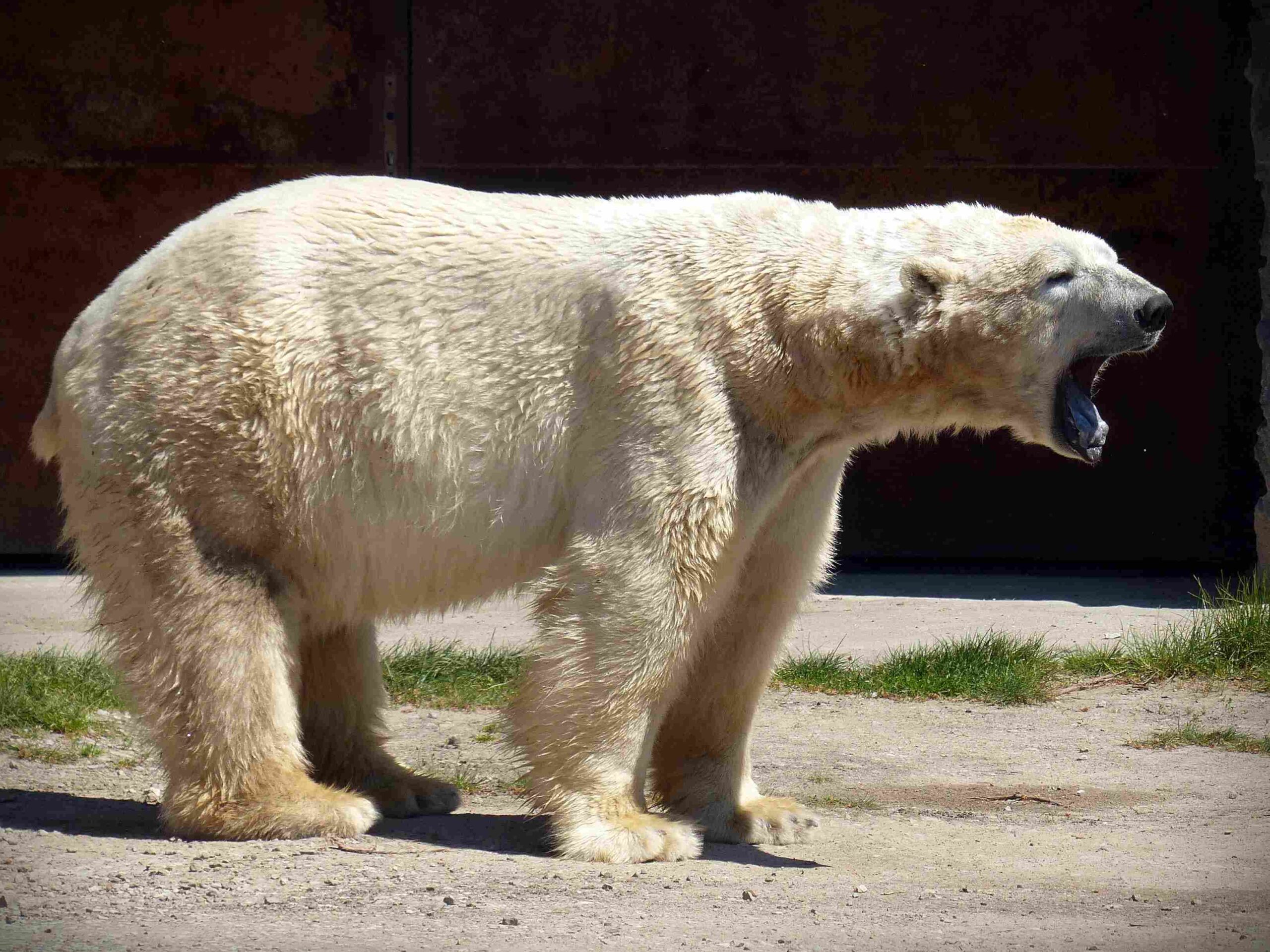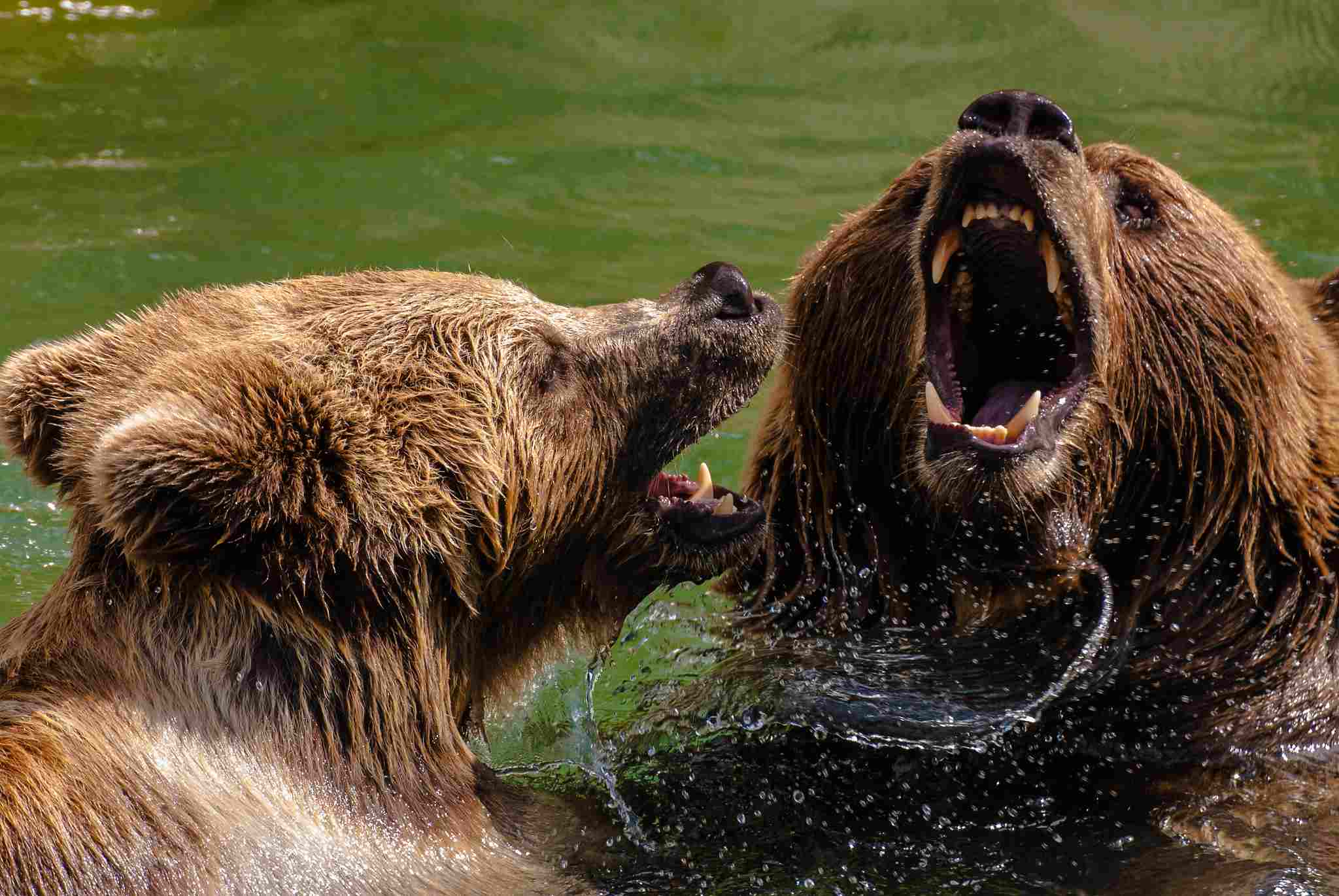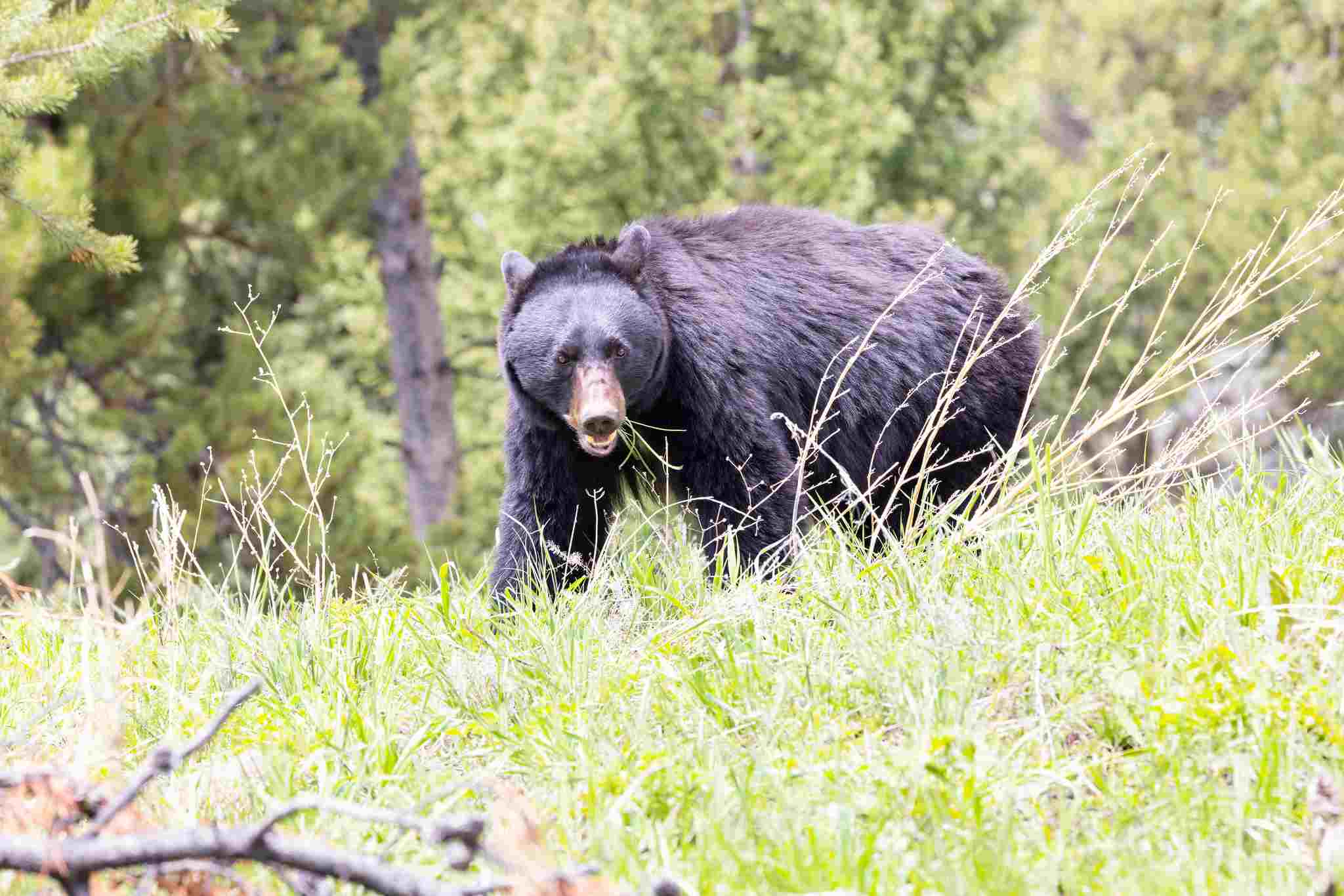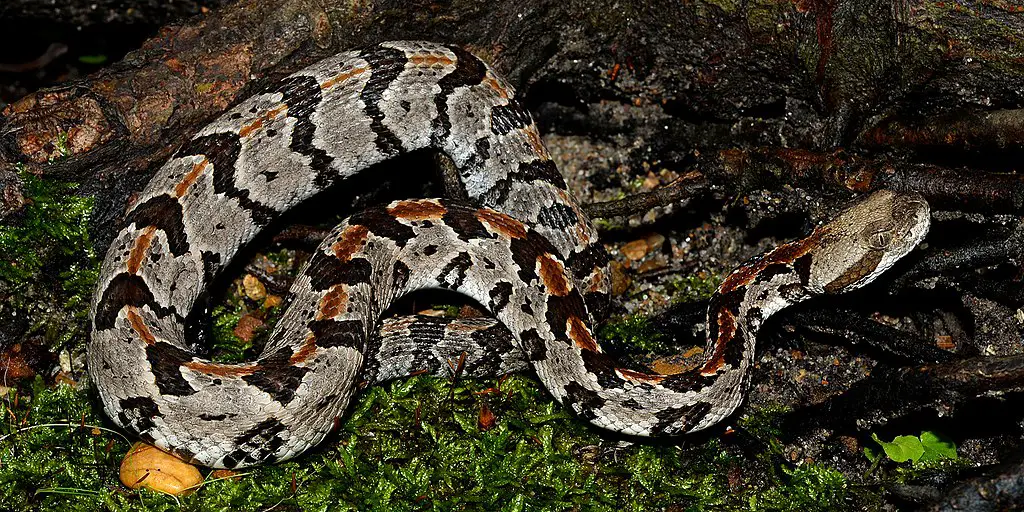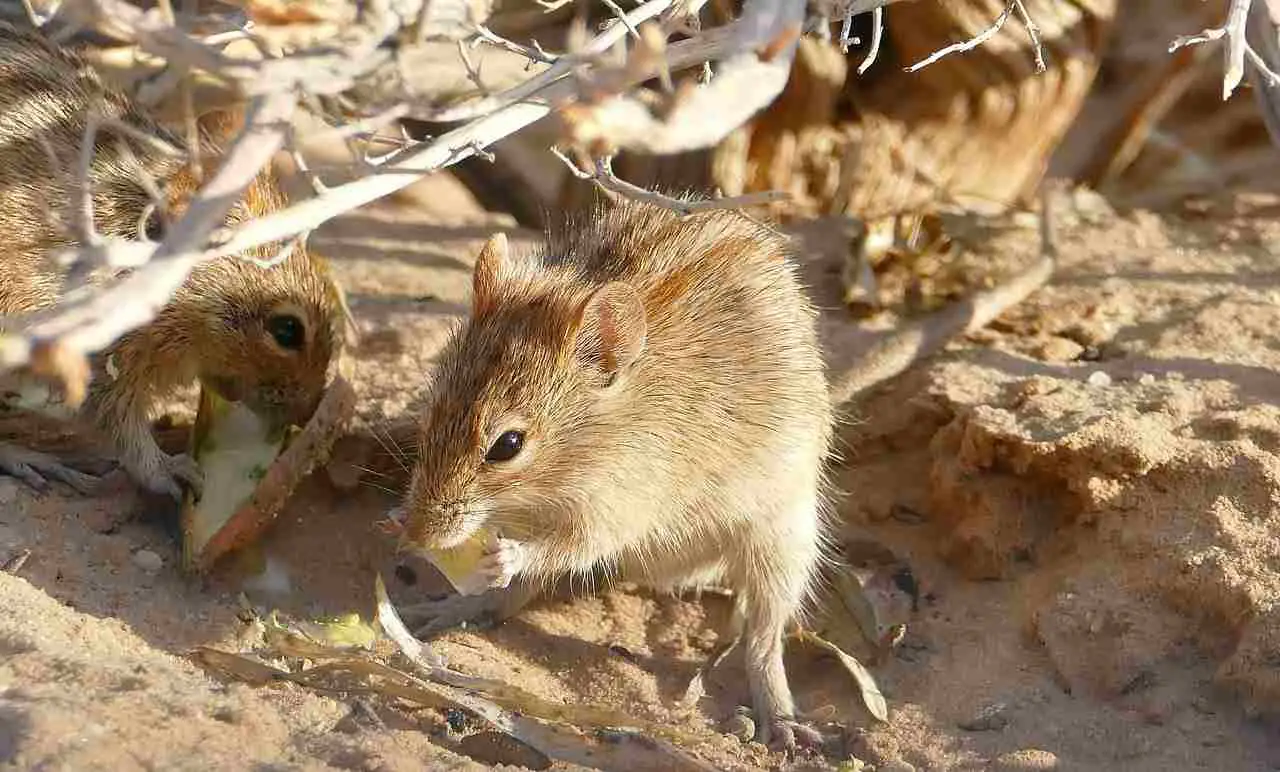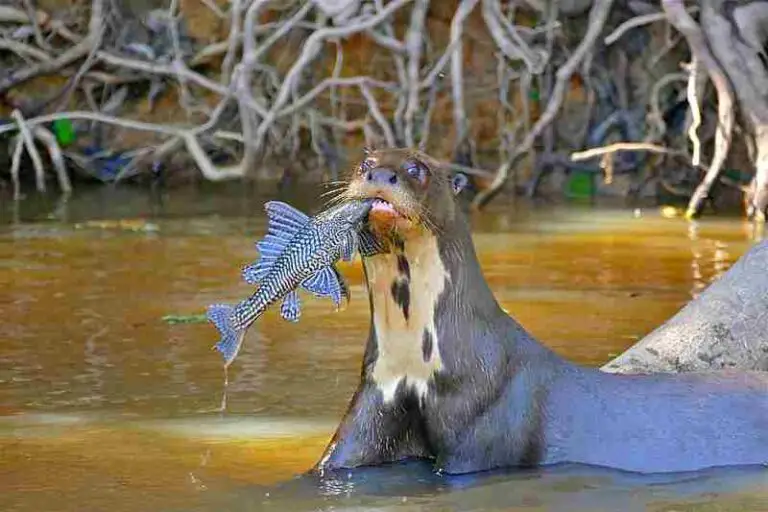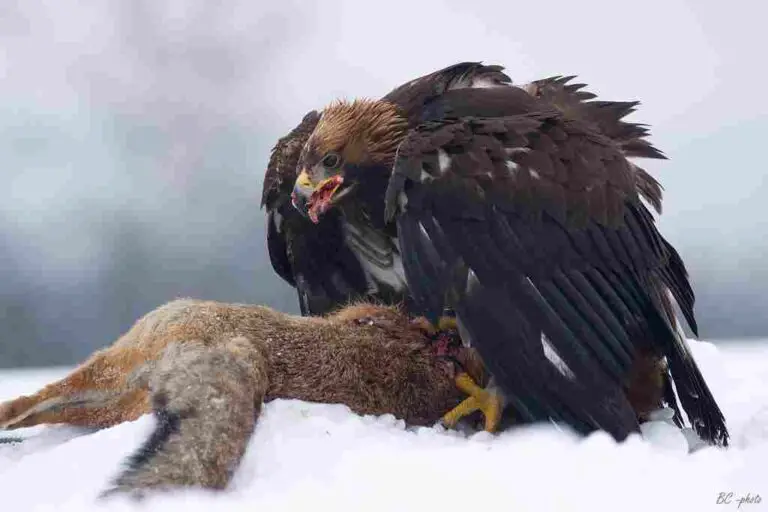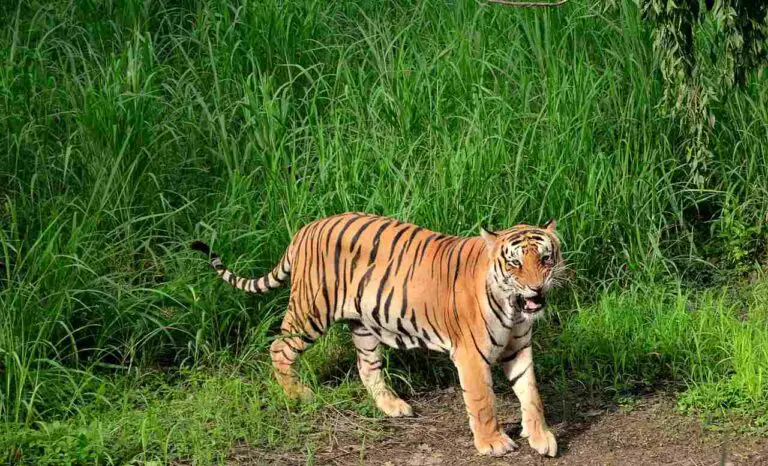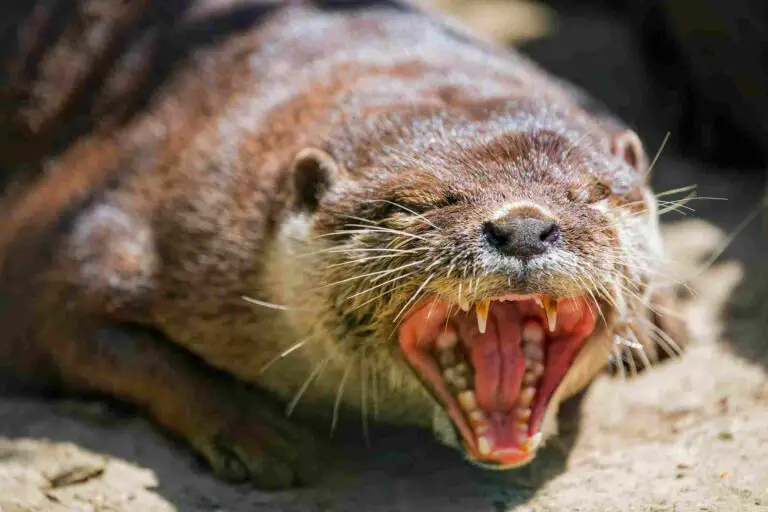23+ Dangerous Animals In Tennessee Discussed
1. Black Bear
The Black Bear (Ursus americanus) is the most commonly found bear in Tennessee’s forests, and while generally not aggressive, they can be dangerous if provoked or if they feel their territory is threatened. These omnivorous mammals are large and strong, with adult males reaching weights of over 600 pounds, making them a formidable presence in the wilderness. Black Bears are typically shy, preferring to avoid human contact, but they can become defensive if their cubs are nearby, or if they are startled. Encounters with Black Bears often happen near campsites or hiking trails where food might attract them. To stay safe, hikers and campers should store food properly, keep a safe distance, and never attempt to feed or approach these bears. If a Black Bear is encountered, it’s best to remain calm, back away slowly, and make noise to avoid surprising the animal.
2. Timber Rattlesnake
The Timber Rattlesnake (Crotalus horridus) is one of the most venomous snakes in Tennessee and is known for its distinctive rattling sound, used to warn off threats. It typically inhabits wooded areas, rocky ridges, and hilly terrain. While encounters with humans are rare, the Timber Rattlesnake can deliver a potent bite if provoked or accidentally disturbed. To avoid conflict, it’s essential to stay on marked trails and be cautious when stepping over rocks or logs. If bitten, immediate medical attention is crucial, as the venom can cause severe pain, swelling, and potentially life-threatening complications.
3. Copperhead Snake
The Copperhead Snake (Agkistrodon contortrix) is a common venomous snake in Tennessee, characterized by its coppery-brown color and hourglass-shaped bands. Found in a variety of habitats, including forests, fields, and near water sources, Copperhead bites are usually not fatal but can be extremely painful. These snakes often remain still and rely on their camouflage, leading to accidental encounters. To reduce risk, be cautious in areas with tall grass or dense vegetation, and never reach into places where you can’t see clearly. If bitten, seek medical attention immediately to manage symptoms and prevent complications.
4. Cottonmouth (Water Moccasin)
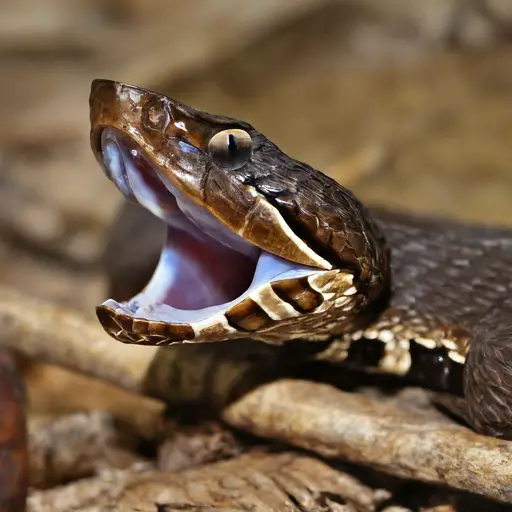
The Cottonmouth (Agkistrodon piscivorus), also known as the Water Moccasin, is a venomous snake commonly found near bodies of water in Tennessee. It gets its name from the white interior of its mouth, which it often displays as a warning sign when threatened. While generally avoiding humans, Cottonmouths can be aggressive if approached. They are strong swimmers and often inhabit swamps, rivers, and lakeshores. To stay safe, avoid wading in murky water and be vigilant near the water’s edge. If you encounter a Cottonmouth, give it space and do not attempt to handle it. A bite from a Cottonmouth requires immediate medical attention due to the risk of severe tissue damage.
5. Brown Recluse Spider
The Brown Recluse Spider (Loxosceles reclusa) is a venomous arachnid commonly found in Tennessee, known for its violin-shaped marking on its back. Though shy by nature, it can bite if inadvertently disturbed, leading to serious medical complications. Brown Recluse venom can cause necrosis, resulting in severe skin damage and, in rare cases, systemic symptoms. These spiders often inhabit dark, undisturbed places like basements, closets, and attics. To avoid bites, be cautious when reaching into hidden areas, and consider wearing gloves when moving storage boxes or cleaning. If bitten, seek medical attention to prevent the spread of tissue damage and ensure proper treatment.
6. Black Widow Spider
The Black Widow Spider (Latrodectus mactans) is a venomous spider found in Tennessee, easily recognized by its shiny black body and red hourglass marking on the abdomen. These spiders prefer dark, secluded areas such as woodpiles, crawl spaces, and sheds. Although Black Widows are typically non-aggressive, they can bite if threatened or accidentally disturbed, delivering a neurotoxic venom that can cause severe pain, muscle cramps, and other systemic symptoms. To reduce risk, take precautions when working in areas where Black Widows might be present, and wear gloves for added protection. If bitten, it’s crucial to seek immediate medical attention to manage the venom’s effects.
7. Coyote
The Coyote (Canis latrans) is a highly adaptable predator found throughout Tennessee, capable of thriving in various environments, from forests to urban areas. Although generally shy and avoiding human contact, Coyotes can pose a risk to pets and, in rare cases, people if they become habituated to human presence or feel threatened. Coyotes are opportunistic feeders, often attracted to pet food left outside or unsecured trash bins. To minimize risks, keep pets indoors or closely supervised, secure trash and food sources, and avoid feeding Coyotes. If you encounter a Coyote, make loud noises and appear as large as possible to deter it from approaching.
8. Bobcat
The Bobcat (Lynx rufus) is a medium-sized wildcat native to Tennessee, known for its tufted ears and short tail. Bobcats are generally elusive and prefer to avoid human interaction, typically hunting small mammals, birds, and reptiles. However, they can become aggressive if cornered or if their cubs are threatened. Bobcats are most active during dawn and dusk, making encounters more likely at these times. To reduce the risk of conflict, avoid approaching or feeding these wildcats, and ensure that pets are kept indoors or under supervision. If you encounter a Bobcat, maintain a safe distance and never attempt to approach or capture it.
9. Wild Boar
Wild Boars (Sus scrofa) are invasive animals in Tennessee known for their aggressive behavior and destructive habits. These large mammals have powerful tusks and can weigh over 200 pounds. They are often found in wooded areas and agricultural lands, where they cause significant damage to crops and property. Wild Boars are highly territorial and can be dangerous when threatened, posing a risk to humans and domestic animals. To stay safe, avoid areas where Wild Boars are known to roam, and never approach them, especially when piglets are present. If encountered, back away slowly and give them plenty of space to avoid provoking an attack.
10. Red Wolf
The Red Wolf (Canis rufus) is a critically endangered species native to Tennessee, with only a small population remaining in the wild. Despite their endangered status, Red Wolves can still pose a threat to livestock and, in rare cases, to humans if they feel threatened or cornered. These wolves are generally shy and prefer to avoid human contact, but their territorial nature can lead to aggressive behavior if they perceive a threat. To minimize conflict, avoid approaching Red Wolves, and respect their habitats. If you encounter a Red Wolf, maintain a safe distance and do not attempt to interact with or feed it.
11. Alligator
Alligators (Alligator mississippiensis) are large reptiles that have recently been spotted in Tennessee, typically in the state’s southern regions. These formidable creatures can grow to over 10 feet in length and are equipped with powerful jaws and sharp teeth. While generally preferring to avoid humans, Alligators can become aggressive if provoked or during nesting season. They are commonly found near lakes, rivers, and swamps. To stay safe, avoid swimming in Alligator-inhabited waters, keep pets away from water edges, and do not feed or approach these reptiles. If you encounter an Alligator, maintain a significant distance and notify wildlife authorities if it poses a safety risk.
12. Eastern Box Turtle (Salmonella risk)
The Eastern Box Turtle (Terrapene carolina carolina) is a common reptile in Tennessee, valued for its distinctive dome-shaped shell and colorful patterns. Although generally harmless, these turtles can carry Salmonella bacteria, posing a risk of infection to humans. Salmonella can cause severe gastrointestinal issues and other health complications, particularly in young children, the elderly, or those with weakened immune systems. To minimize the risk, avoid handling Box Turtles without protective gloves, and always wash your hands thoroughly after contact. If keeping a Box Turtle as a pet, ensure proper sanitation practices to prevent the spread of Salmonella.
13. Fire Ant
Fire Ants (Solenopsis spp.) are aggressive, stinging insects found in Tennessee, known for their painful bites and ability to swarm in large numbers. They often build large mounds in open fields and lawns, posing a risk to people and pets who inadvertently disturb their nests. Fire Ant bites can cause intense pain, swelling, and allergic reactions in some individuals. To avoid encounters, be cautious when walking through grassy areas, and watch for signs of Fire Ant mounds. If bitten, clean the affected area and apply cold compresses to reduce pain and swelling. Seek medical attention if severe reactions occur or if bitten multiple times.
14. Bald Eagle (when provoked)
The Bald Eagle (Haliaeetus leucocephalus) is the national bird of the United States and a protected species in Tennessee. Generally majestic and non-aggressive, Bald Eagles can become dangerous when provoked or if their nests are disturbed. They have sharp talons and powerful beaks, making them formidable opponents when defending their territory. Bald Eagles are often found near large bodies of water, where they hunt for fish. To stay safe, avoid approaching Bald Eagles or their nests, and observe them from a distance using binoculars or cameras. If confronted by an aggressive Bald Eagle, seek shelter and do not attempt to engage or harm the bird.
15. Great Horned Owl
The Great Horned Owl (Bubo virginianus) is a large and powerful bird of prey commonly found in Tennessee. Known for its striking tufts of feathers resembling horns, this owl is a formidable hunter with sharp talons and a strong beak. Although Great Horned Owls typically avoid humans, they can become aggressive if their nests are disturbed or if they perceive a threat. These owls are nocturnal and most active during the night, hunting for small mammals and birds. To avoid conflict, stay clear of known nesting areas, and do not attempt to approach or handle these owls. If a Great Horned Owl becomes aggressive, seek shelter and avoid provoking it further.
16. American Kestrel (can be aggressive)
The American Kestrel (Falco sparverius) is a small falcon found throughout Tennessee, notable for its vibrant colors and swift flight. Although usually not dangerous to humans, it can be aggressive when defending its territory or young. American Kestrels have sharp talons and beaks, allowing them to hunt small prey efficiently. They are often seen near open fields and wooded areas. To avoid conflicts, observe these birds from a distance and avoid approaching their nests. If you encounter an aggressive kestrel, retreat and avoid provoking it further.
17. Skunk (rabies risk)
Skunks, particularly the Striped Skunk (Mephitis mephitis), are known for their potent defensive spray, but they also pose a rabies risk in Tennessee. Skunks typically avoid humans, but they can become aggressive if they feel threatened or if they are infected with rabies. These animals are most active at night and are often found near wooded areas or urban edges. To stay safe, avoid approaching skunks, and if you see one acting strangely, contact wildlife authorities. If you encounter a skunk and it raises its tail, it’s best to back away slowly to avoid getting sprayed.
18. Raccoon (rabies risk)
Raccoons (Procyon lotor) are common in Tennessee, known for their curious nature and dexterous paws. While they are often seen scavenging in urban areas, raccoons can pose a risk due to their potential to carry rabies. If rabid, raccoons may become aggressive and disoriented, increasing the risk of bites or scratches. To avoid conflicts, secure trash bins, and do not leave pet food outside. If you encounter a raccoon acting erratically or showing signs of aggression, contact local wildlife authorities and avoid approaching it.
19. Opossum (disease transmission)
Opossums (Didelphis virginiana) are nocturnal marsupials commonly found in Tennessee, typically feeding on a variety of foods. Although generally non-aggressive, they can carry diseases like leptospirosis and tuberculosis, posing a risk to humans and pets. Opossums are known for “playing dead” when threatened, but they can bite if cornered. To avoid issues, ensure garbage is secured, and do not attempt to handle or trap opossums. If you find an opossum in your home or yard, contact animal control for safe removal.
20. Eastern Rat Snake (non-venomous but can bite)
The Eastern Rat Snake (Pantherophis alleghaniensis) is a non-venomous snake found in Tennessee, known for its role in controlling rodent populations. Although generally harmless to humans, these snakes can bite if threatened or handled roughly. They are often found in wooded areas, barns, and attics. To reduce the risk of bites, avoid handling Eastern Rat Snakes, and be cautious when reaching into hidden spaces. If bitten, clean the wound thoroughly to prevent infection, and seek medical attention if symptoms worsen.
21. Red Fox
The Red Fox (Vulpes vulpes) is a cunning predator commonly found in Tennessee, recognized by its bushy tail and reddish fur. Although generally wary of humans, Red Foxes can become aggressive if they feel threatened or if they are rabid. These animals are often seen in wooded areas or suburban landscapes. To avoid conflicts, do not attempt to feed or approach Red Foxes, and keep pets secure at night. If you encounter a Red Fox exhibiting unusual behavior, contact wildlife authorities to ensure public safety.
22. Gray Fox
The Gray Fox (Urocyon cinereoargenteus) is another common fox species in Tennessee, known for its ability to climb trees and its grayish fur. Similar to the Red Fox, Gray Foxes are usually cautious around humans but can pose a risk if they are rabid or feel threatened. They inhabit wooded areas and often come close to suburban neighborhoods in search of food. To minimize risks, avoid approaching or feeding Gray Foxes, and secure garbage and pet food. If you suspect a Gray Fox has rabies, notify local wildlife authorities for proper handling.
23. Striped Skunk
The Striped Skunk (Mephitis mephitis) is a common skunk species in Tennessee, identifiable by its black fur and distinctive white stripes. While known for its pungent spray, it also poses a risk due to its potential to carry rabies. Striped Skunks are nocturnal and often found near wooded areas and residential zones. To stay safe, avoid approaching skunks, especially if they display erratic behavior. If you encounter a Striped Skunk raising its tail, back away slowly to avoid getting sprayed. Contact wildlife authorities if you suspect a skunk is rabid or acting strangely.
24. Bats (rabies risk)
Bats are essential to Tennessee’s ecosystem, but they can carry rabies, posing a risk to humans and pets. Various bat species are found in the state, often roosting in caves, attics, and trees. Although bats generally avoid human contact, they can bite if handled or disturbed. To minimize risks, avoid touching or attempting to capture bats, and ensure your home is sealed to prevent bats from entering. If bitten or scratched by a bat, seek medical attention immediately due to the risk of rabies, and contact local health authorities for guidance.
| Animal | Risk/Danger |
| Black Bear |
Can be aggressive if provoked or threatened
|
| Timber Rattlesnake |
Venomous, delivers potent bites
|
| Copperhead Snake |
Venomous, can cause severe pain and tissue damage
|
| Cottonmouth (Water Moccasin) |
Venomous, can be aggressive near water
|
| Brown Recluse Spider |
Venomous, can cause tissue necrosis
|
| Black Widow Spider |
Venomous, can cause severe pain and cramps
|
| Coyote |
Can be aggressive, especially if habituated to humans
|
| Bobcat |
Can be aggressive when cornered or threatened
|
| Wild Boar |
Aggressive and destructive
|
| Red Wolf |
Can be aggressive if threatened or cornered
|
| Alligator |
Aggressive if provoked, recently spotted in TN
|
| Eastern Box Turtle | Salmonella risk |
| Fire Ant |
Aggressive, painful bites, allergic reactions
|
| Bald Eagle |
Can be aggressive when provoked
|
| Great Horned Owl |
Aggressive if nest is threatened
|
| American Kestrel |
Can be aggressive when defending territory
|
| Skunk |
Rabies risk, can spray if threatened
|
| Raccoon |
Rabies risk, can become aggressive
|
| Opossum |
Disease transmission risk
|
| Eastern Rat Snake |
Non-venomous but can bite
|
| Red Fox |
Can be aggressive, rabies risk
|
| Gray Fox |
Can be aggressive, rabies risk
|
| Striped Skunk |
Rabies risk, can spray if threatened
|
| Bats |
Rabies risk, can bite if disturbed
|
